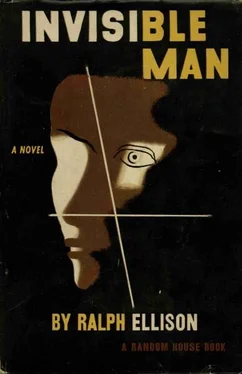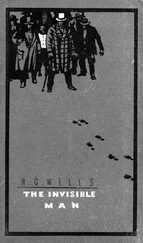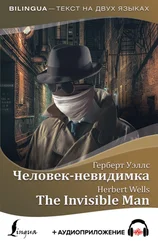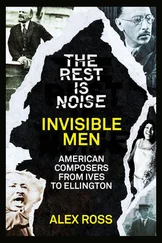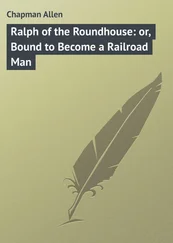Ralph Ellison - Invisible man
Здесь есть возможность читать онлайн «Ralph Ellison - Invisible man» весь текст электронной книги совершенно бесплатно (целиком полную версию без сокращений). В некоторых случаях можно слушать аудио, скачать через торрент в формате fb2 и присутствует краткое содержание. Год выпуска: 1995, ISBN: 1995, Издательство: Vintage Books, Жанр: Классическая проза, на английском языке. Описание произведения, (предисловие) а так же отзывы посетителей доступны на портале библиотеки ЛибКат.
- Название:Invisible man
- Автор:
- Издательство:Vintage Books
- Жанр:
- Год:1995
- ISBN:9780679732761
- Рейтинг книги:4 / 5. Голосов: 1
-
Избранное:Добавить в избранное
- Отзывы:
-
Ваша оценка:
- 80
- 1
- 2
- 3
- 4
- 5
Invisible man: краткое содержание, описание и аннотация
Предлагаем к чтению аннотацию, описание, краткое содержание или предисловие (зависит от того, что написал сам автор книги «Invisible man»). Если вы не нашли необходимую информацию о книге — напишите в комментариях, мы постараемся отыскать её.
The Waste Land,
Invisible man — читать онлайн бесплатно полную книгу (весь текст) целиком
Ниже представлен текст книги, разбитый по страницам. Система сохранения места последней прочитанной страницы, позволяет с удобством читать онлайн бесплатно книгу «Invisible man», без необходимости каждый раз заново искать на чём Вы остановились. Поставьте закладку, и сможете в любой момент перейти на страницу, на которой закончили чтение.
Интервал:
Закладка:
"All right, all right," I called out, feeling desperate. It wasn't the way I wanted it to go, it wasn't political. Brother Jack probably wouldn't approve of it at all, but I had to keep going as I could go.
"Listen to me standing up on this so-called mountain!" I shouted. "Let me tell it as it truly was! His name was Tod Clifton and he was full of illusions. He thought he was a man when he was only Tod Clifton. He was shot for a simple mistake of judgment and he bled and his blood dried and shortly the crowd trampled out the stains. It was a normal mistake of which many are guilty: He thought he was a man and that men were not meant to be pushed around. But it was hot downtown and he forgot his history, he forgot the time and the place. He lost his hold on reality. There was a cop and a waiting audience but he was Tod Clifton and cops are everywhere. The cop? What about him? He was a cop. A good citizen. But this cop had an itching finger and an eager ear for a word that rhymed with 'trigger,' and when Clifton fell he had found it. The Police Special spoke its lines and the rhyme was completed. Just look around you. Look at what he made, look inside you and feel his awful power. It was perfectly natural. The blood ran like blood in a comic-book killing, on a comic-book street in a comic-book town on a comic-book day in a comic-book world.
"Tod Clifton's one with the ages. But what's that to do with you in this heat under this veiled sun? Now he's part of history, and he has received his true freedom. Didn't they scribble his name on a standardized pad? His Race: colored! Religion: unknown, probably born Baptist. Place of birth: U.S. Some southern town. Next of kin: unknown. Address: unknown. Occupation: unemployed. Cause of death (be specific): resisting reality in the form of a .38 caliber revolver in the hands of the arresting officer, on Forty-second between the library and the subway in the heat of the afternoon, of gunshot wounds received from three bullets, fired at three paces, one bullet entering the right ventricle of the heart, and lodging there, the other severing the spinal ganglia traveling downward to lodge in the pelvis, the other breaking through the back and traveling God knows where.
"Such was the short bitter life of Brother Tod Clifton. Now he's in this box with the bolts tightened down. He's in the box and we're in there with him, and when I've told you this you can go. It's dark in this box and it's crowded. It has a cracked ceiling and a clogged-up toilet in the hall. It has rats and roaches, and it's far, far too expensive a dwelling. The air is bad and it'll be cold this winter. Tod Clifton is crowded and he needs the room. 'Tell them to get out of the box,' that's what he would say if you could hear him. 'Tell them to get out of the box and go teach the cops to forget that rhyme. Tell them to teach them that when they call you nigger to make a rhyme with trigger it makes the gun backfire.'
"So there you have it. In a few hours Tod Clifton will be cold bones in the ground. And don't be fooled, for these bones shall not rise again. You and I will still be in the box. I don't know if Tod Clifton had a soul. I only know the ache that I feel in my heart, my sense of loss. I don't know if you have a soul. I only know you are men of flesh and blood; and that blood will spill and flesh grow cold. I do not know if all cops are poets, but I know that all cops carry guns with triggers. And I know too how we are labeled. So in the name of Brother Clifton beware of the triggers; go home, keep cool, stay safe away from the sun. Forget him. When he was alive he was our hope, but why worry over a hope that's dead? So there's only one thing left to tell and I've already told it. His name was Tod Clifton, he believed in Brotherhood, he aroused our hopes and he died."
I couldn't go on. Below, they were waiting, hands and handkerchiefs shading their eyes. A preacher stepped up and read something out of his Bible, and I stood looking at the crowd with a sense of failure. I had let it get away from me, had been unable to bring in the political issues. And they stood there sun-beaten and sweat-bathed, listening to me repeat what was known. Now the preacher had finished, and someone signaled the bandmaster and there was solemn music as the pallbearers carried the coffin down the spiraling stairs. The crowd stood still as we walked slowly through. I could feel the bigness of it and the unknownness of it and a pent-up tension -- whether of tears or anger, I couldn't tell. But as we walked through and down the hill to the hearse, I could feel it. The crowd sweated and throbbed, and though it was silent, there were many things directed toward me through its eyes. At the curb were the hearse and a few cars, and in a few minutes they were loaded and the crowd was still standing, looking on as we carried Tod Clifton away. And as I took one last look I saw not a crowd but the set faces of individual men and women.
We drove away and when the cars stopped moving there was a grave and we placed him in it. The gravediggers sweated heavily and knew their business and their brogue was Irish. They filled the grave quickly and we left. Tod Clifton was underground.
I returned through the streets as tired as though I'd dug the grave myself alone. I felt confused and listless moving through the crowds that seemed to boil along in a kind of mist, as though the thin humid clouds had thickened and settled directly above our heads. I wanted to go somewhere, to some cool place to rest without thinking, but there was still too much to be done; plans had to be made; the crowd's emotion had to be organized. I crept along, walking a southern walk in southern weather, closing my eyes from time to time against the dazzling reds, yellows and greens of cheap sport shirts and summer dresses. The crowd boiled, sweated, heaved; women with shopping bags, men with highly polished shoes. Even down South they'd always shined their shoes. "Shined shoes, shoed shines," it rang in my head. On Eighth Avenue, the market carts were parked hub to hub along the curb, improvised canopies shading the withering fruits and vegetables. I could smell the stench of decaying cabbage. A watermelon huckster stood in the shade beside his truck, holding up a long slice of orange-mealed melon, crying his wares with hoarse appeals to nostalgia, memories of childhood, green shade and summer coolness. Oranges, cocoanuts and alligator pears lay in neat piles on little tables. I passed, winding my way through the slowly moving crowd. Stale and wilted flowers, rejected downtown, blazed feverishly on a cart, like glamorous rags festering beneath a futile spray from a punctured fruit juice can. The crowd were boiling figures seen through steaming glass from inside a washing machine; and in the streets the mounted police detail stood looking on, their eyes noncommittal beneath the short polished visors of their caps, their bodies slanting forward, reins slackly alert, men and horses of flesh imitating men and horses of stone. Tod Clifton's Tod, I thought. The hucksters cried above the traffic sounds and I seemed to hear them from a distance, unsure of what they said. In a side street children with warped tricycles were parading along the walk carrying one of the signs, BROTHER TOD CLIFTON, OUR HOPE SHOT DOWN.
And through the haze I again felt the tension. There was no denying it; it was there and something had to be done before it simmered away in the heat.
Chapter 22
When I saw them sitting in their shirtsleeves, leaning forward, gripping their crossed knees with their hands, I wasn't surprised. I'm glad it's you, I thought, this will be business without tears. It was as though I had expected to find them there, just as in those dreams in which I encountered my grandfather looking at me from across the dimensionless space of a dream-room. I looked back without surprise or emotion, although I knew even in the dream that surprise was the normal reaction and that the lack of it was to be distrusted, a warning.
Читать дальшеИнтервал:
Закладка:
Похожие книги на «Invisible man»
Представляем Вашему вниманию похожие книги на «Invisible man» списком для выбора. Мы отобрали схожую по названию и смыслу литературу в надежде предоставить читателям больше вариантов отыскать новые, интересные, ещё непрочитанные произведения.
Обсуждение, отзывы о книге «Invisible man» и просто собственные мнения читателей. Оставьте ваши комментарии, напишите, что Вы думаете о произведении, его смысле или главных героях. Укажите что конкретно понравилось, а что нет, и почему Вы так считаете.
